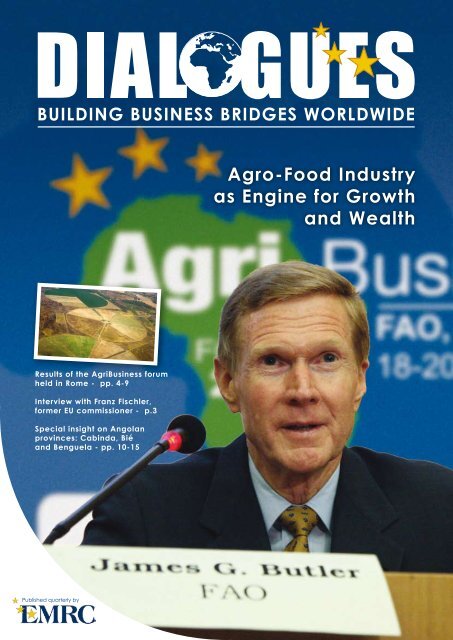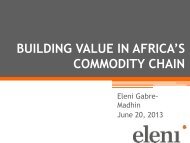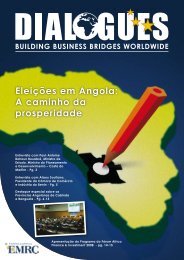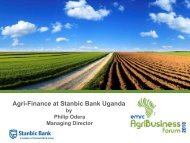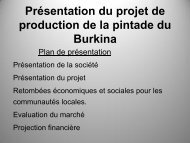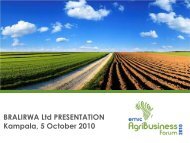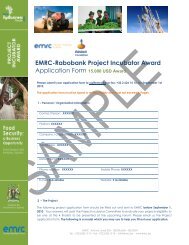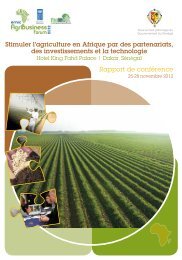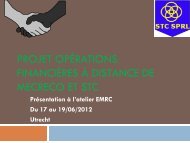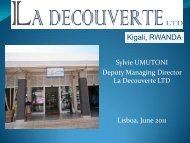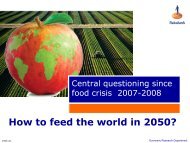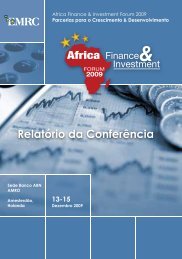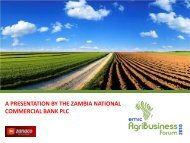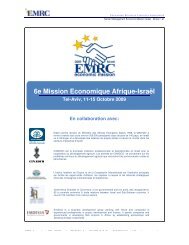Agro-Food Industry as Engine for Growth and Wealth - EMRC
Agro-Food Industry as Engine for Growth and Wealth - EMRC
Agro-Food Industry as Engine for Growth and Wealth - EMRC
You also want an ePaper? Increase the reach of your titles
YUMPU automatically turns print PDFs into web optimized ePapers that Google loves.
Building business bridges worldwide<br />
<strong>Agro</strong>-<strong>Food</strong> <strong>Industry</strong><br />
<strong>as</strong> <strong>Engine</strong> <strong>for</strong> <strong>Growth</strong><br />
<strong>and</strong> <strong>Wealth</strong><br />
Results of the AgriBusiness <strong>for</strong>um<br />
held in Rome - pp. 4-9<br />
Interview with Franz Fischler,<br />
<strong>for</strong>mer EU commissioner - p.3<br />
Special insight on Angolan<br />
provinces: Cabinda, Bié<br />
<strong>and</strong> Benguela - pp. 10-15<br />
Published quarterly by
Editorial<br />
Philippe van Maldeghem<br />
Editor-in-Chief<br />
The 21st century’s dilemma:<br />
<strong>Food</strong> Security vs. Energy Needs<br />
Upcoming projects this year:<br />
- DIALOGUES - <strong>EMRC</strong><br />
■ Economic Mission Africa-Israel, Tel-Aviv: 19-23 October 2008<br />
■ Economic Mission to Bié, Angola: October 2008<br />
■ Next issue of Dialogues, with special focus on a few Angolan provinces: Autumn 2008<br />
■ European Development Days, Str<strong>as</strong>bourg, France: 15-17 November 2008<br />
■ Economic Mission to Chad: November 2008<br />
■ Africa Finance <strong>and</strong> Investment Forum 2008 (AFIF), Paris, France: 7-9 December 2008<br />
Building business bridges<br />
worldwide<br />
Published quarterly<br />
by<br />
In theory, food security is a human rights issue, but in practice, it is rather a question of economics. This<br />
dichotomy applies harshly to developing countries, since their leaders are continuously facing a dilemma<br />
between economic growth <strong>and</strong> their people’s welfare. Oil prices have never been so high in the p<strong>as</strong>t<br />
fourty years, thus some governments choose rightly to diversify their energy sources, <strong>and</strong> venture into<br />
the “Biofuels leitmotiv”. But un<strong>for</strong>tunately, some countries refuse to admit it is too soon <strong>for</strong> them to do<br />
so. Encouraging biofuels crops in regions where people suffer from hunger can be dis<strong>as</strong>trous in the long<br />
run, since this incentive will drive farmers to use their l<strong>and</strong> <strong>for</strong> that purpose only, in search <strong>for</strong> higher<br />
returns. One should be careful with this new opportunity, <strong>as</strong> food <strong>and</strong> energy are interlinked: an incre<strong>as</strong>e<br />
in fuel <strong>and</strong> transport costs, devaluation of currencies or market speculation lead inevitably to a rise in<br />
food prices, ultimately borne by the final customers. Supplies will then decre<strong>as</strong>e accordingly, although<br />
the dem<strong>and</strong> still remains…<br />
These critical debates on the world food crisis were addressed l<strong>as</strong>t June at the FAO headquarters in Rome,<br />
which hosted two major events: the first one from FAO’s initiative, a high-level political conference<br />
linking food scarcity <strong>and</strong> climate change, <strong>and</strong> the second one organised by <strong>EMRC</strong>, the renowned<br />
“Agribusiness Forum”, gathering businessmen from four different continents.<br />
In this summer edition, Dialogues will focus on Angola, one of the f<strong>as</strong>test growing economies in Africa.<br />
After a long civil war, the country is finally entering a peaceful period <strong>and</strong> will hold legislative elections in<br />
September. The Provincial Governments have played a key role in the peace process <strong>and</strong> in the economic<br />
development of the country. In this edition we present some of the projects <strong>and</strong> opportunities in the<br />
provinces of Cabinda, Benguela <strong>and</strong> Bié.<br />
The magazine also presents the outcome of the Agribusiness Forum, where we give the floor to<br />
personalities presenting their projects, visions <strong>and</strong> success stories. This is precisely the mission of the<br />
<strong>EMRC</strong> network: to give the opportunity <strong>for</strong> every entrepreneur to show their abilities <strong>and</strong> opportunities,<br />
in order to create direct partnerships. To paraphr<strong>as</strong>e the UN Secretary General, Ban Ki-Moon, during<br />
the political meeting at FAO, people should leave the conference “with a sense of purpose <strong>and</strong> mission,<br />
knowing that we are allied in our determination to make a difference. Hundreds of millions of the world’s<br />
people expect no less”...<br />
Publisher: Idit Miller<br />
Editor-in-Chief:<br />
Philippe van Maldeghem<br />
Main contributors:<br />
Jeanne McCaul,<br />
Pierre Coetzer<br />
Designer: Bird<br />
ADVERTISING INQUIRIES<br />
Communications Officer:<br />
Seán Kerrigan<br />
Tel: +32 (0)2 626 15 17<br />
Fax: +32 (0)2 626 15 16<br />
Email: sk@emrc.be or<br />
dialogues@emrc.be<br />
<strong>EMRC</strong> International<br />
Av. Louise, 283/22<br />
Brussels 1050, Belgium<br />
Tel: +32 (0)2 626 15 15<br />
Fax: +32 (0)2 626 15 16<br />
Email: info@emrc.be<br />
Website: www.emrc.be<br />
The views expressed in this issue of Dialogues are the private views of individuals <strong>and</strong> are not necessarily those of <strong>EMRC</strong> International, its executive committee, or members of its business<br />
network. Reproduction in whole or in part is permitted, providing that any such reproductions, whether in whole or in part, are not sold, unless they are incorporated in other works.<br />
I nterview<br />
Franz Fischler<br />
Former European Commissioner (1995-2004)<br />
successively <strong>for</strong> Agriculture <strong>and</strong> Fisheries<br />
“<strong>EMRC</strong>’s <strong>for</strong>um is precisely a way to stimulate<br />
the entrepreneurial behaviour in Africa.”<br />
■ Dialogues: Given your expertise, what<br />
is your <strong>as</strong>sessment of the subsidies given to<br />
EU farmers, which are perceived by African<br />
farmers <strong>as</strong> preventing them from competing<br />
at a fair price?<br />
Franz Fischler: Firstly, a lot depends on the<br />
type of subsidies <strong>and</strong> the way they are given to<br />
the farmers. The problem is that the European<br />
Union h<strong>as</strong> been used to giving, in the p<strong>as</strong>t, exports<br />
subsidies, which means that the prices<br />
on exports get reduced, in order to become<br />
more competitive. Today it is a huge problem,<br />
<strong>and</strong> these practices must be discontinued. I<br />
personally cannot see this practice go further,<br />
<strong>and</strong> I notified all the WTO members,<br />
together with P<strong>as</strong>cal Lamy, current Director<br />
General of the World Trade Organization<br />
(WTO), saying that Europe is prepared<br />
to ph<strong>as</strong>e out all the subsidies on export. We<br />
expect others to follow our initiative.<br />
Secondly, the direct support given to the<br />
farmers depends on the way it is done by<br />
the EU. Following the EU’s re<strong>for</strong>m, support<br />
is given directly to the farmers, <strong>and</strong> there is<br />
no link anymore to the product or the production<br />
process. There<strong>for</strong>e, this type of support<br />
is not distorted by trade or competition. This<br />
is different from the way the US are supporting<br />
their farmers. Thus, by non-discriminating,<br />
we are ahead of the Americans’ practices.<br />
Then, what the EU h<strong>as</strong> also done is to give its<br />
support only under certain conditions; among<br />
the main ones, the farmers must fulfil higher<br />
environmental st<strong>and</strong>ards, higher animal welfare<br />
st<strong>and</strong>ards <strong>and</strong> higher nutritional st<strong>and</strong>ards<br />
compared to other parts of the world. This is<br />
the real justification.<br />
■ Dialogues: In your opinion, what<br />
me<strong>as</strong>ures can the European Commission put<br />
together to fight against import barriers from<br />
African countries?<br />
FF: Truly, international trade requires the use<br />
of certain minimal st<strong>and</strong>ards, <strong>as</strong> we cannot<br />
take the risk of importing dise<strong>as</strong>es. If they are<br />
not fulfilled, neither will you be allowed to<br />
export, nor will you find any market <strong>for</strong> your<br />
product. In my view, this is the area where the<br />
concept of “Aid <strong>for</strong> Trade” should take place,<br />
Rome, June 2008<br />
which w<strong>as</strong> propagated by Jozef Stiggitz. In<br />
other words, I think that the industrialized<br />
world must help the African countries, companies<br />
<strong>and</strong> farmers so that they become able to<br />
fulfil these minimal st<strong>and</strong>ards. There<strong>for</strong>e our<br />
st<strong>and</strong>ards must be improved, but we must help<br />
African farmers to implement them.<br />
Regarding trade barriers, it is a matter of<br />
fact that in the p<strong>as</strong>t, the EU st<strong>and</strong>ards were<br />
seen <strong>as</strong> a kind of “hidden” trade barrier, <strong>and</strong><br />
we must adapt them. The st<strong>and</strong>ards must<br />
be objective <strong>and</strong> the same <strong>for</strong> everybody.<br />
<strong>EMRC</strong>’s network <strong>for</strong>ums<br />
help public <strong>and</strong> private actors to<br />
think differently, <strong>and</strong> take action<br />
<strong>for</strong> themselves locally.<br />
In addition to that, African countries must reflect<br />
upon the ways that they implement their<br />
own rules: very often, there is a blockage in<br />
trade between African countries. We have<br />
only been recently aware of the fact that when<br />
countries introduce “export taxes” or “restrictions<br />
<strong>for</strong> imports”, at the end, these me<strong>as</strong>ures<br />
could become counter-productive since the<br />
purpose of offering a sustainable supply of<br />
food might not be met.<br />
■ Dialogues: The supply of food is currently<br />
a worldwide problem. <strong>EMRC</strong>’s AgriBusiness<br />
Forum in the FAO headquarters comes in<br />
line with the FAO <strong>Food</strong> Crisis summit held at<br />
the beginning of June in the same premises.<br />
Since <strong>EMRC</strong>’s <strong>for</strong>um puts businessmen <strong>and</strong><br />
thinkers together, what should be achieved<br />
in order to diminish the impact of this food<br />
crisis?<br />
FF: There is a difference between the way we<br />
h<strong>and</strong>le the present food crisis <strong>and</strong> what should<br />
be done in order to reduce the risk of a new<br />
crisis in the future. On the one h<strong>and</strong>, about the<br />
present crisis, the immediate reaction should<br />
be to incre<strong>as</strong>e the amount of money supplied<br />
by industrialized countries to the UN food<br />
programmes, since they directly fight against<br />
the incre<strong>as</strong>ing number of malnutrition<br />
c<strong>as</strong>es. On the other h<strong>and</strong>, the prospects<br />
<strong>for</strong> the future are much more complex. Concepts<br />
such <strong>as</strong> “one feeds all” don’t work in<br />
practice <strong>and</strong> cannot be adapted to any given<br />
situation. Tools are often not adapted to their<br />
specific weather conditions, <strong>and</strong> we should<br />
invest in the sectors of research <strong>and</strong> development.<br />
People should realize that Agriculture<br />
h<strong>as</strong> become a “know-how intensive” business.<br />
Another tool to prevent the crisis should be<br />
to incre<strong>as</strong>e networking co-operation; in other<br />
words, develop partnerships between private<br />
actors in the food supply chain, between<br />
both continents, so they can learn from each<br />
other. <strong>EMRC</strong>’s <strong>for</strong>um is precisely a way to<br />
stimulate the entrepreneurial behaviour in<br />
Africa. Besides, a new type of co-operation<br />
between private <strong>and</strong> public sectors must be<br />
found, following the example of the EU<br />
“twinning projects” developed towards its<br />
new member states.<br />
But in general, we should think about ways<br />
to incre<strong>as</strong>e our financial aid, <strong>and</strong> we could<br />
consider three approaches: First, the industrialized<br />
countries should fulfil their promise<br />
of allowing 0,7% of their GDP to aid <strong>and</strong> development.<br />
Second, we should try to reduce<br />
the risk of a bursting bubble created by the<br />
speculation on commodities, by introducing a<br />
“capital transition tax” on these operations.<br />
Third, we should establish an international<br />
trading system <strong>for</strong> CO 2<br />
certificates.<br />
Developing countries, which pollute less,<br />
could sell their rights on CO 2<br />
emissions to<br />
industrialized countries, allowing them to use<br />
such money <strong>for</strong> their own development. This<br />
is an innovative way to meet two objectives<br />
at once.<br />
In conclusion, we should stop all discussions<br />
about charity to the developing world, <strong>and</strong><br />
start talking about justice. We have to develop<br />
a new mentality, <strong>and</strong> <strong>EMRC</strong>’s network <strong>for</strong>ums<br />
are positive in the sense that they help public<br />
<strong>and</strong> private actors to think differently, <strong>and</strong><br />
take action <strong>for</strong> themselves locally. We must<br />
contribute to help the developing countries get<br />
the opportunity to speak out <strong>and</strong> participate in<br />
the international market economy. ■<br />
Quarterly - Summer 2008 -
<strong>EMRC</strong> AgriBusiness Forum 2008:<br />
Africa’s private sector h<strong>as</strong> solutions<br />
to face soaring commodity prices<br />
<strong>and</strong> food scarcity<br />
Agri<br />
FORUM<br />
2008<br />
Business<br />
Rome, Italy – The <strong>EMRC</strong> AgriBusiness Forum 2008 (18-20 June), held <strong>for</strong> the second consecutive<br />
year at the FAO (UN <strong>Food</strong> & Agriculture Organization), hosted 185 delegates from 38 countries.<br />
The international business event<br />
demonstrated a positive change in<br />
the African business environment:<br />
Africa attracts private international investment.<br />
Entrepreneurs, project owners, international<br />
investors <strong>and</strong> agricultural experts showc<strong>as</strong>ed<br />
practical business solutions <strong>for</strong> Africa’s food<br />
industry <strong>and</strong> agriculture. A major result of the<br />
<strong>for</strong>um w<strong>as</strong> the Western entrepreneurs’ confirmation<br />
to invest in Africa, establish plants <strong>and</strong><br />
take financial risks. The best initiatives <strong>and</strong><br />
projects were awarded with the <strong>EMRC</strong> Awards<br />
<strong>for</strong> their leadership in promoting Africa’s<br />
AgriBusiness development.<br />
<strong>EMRC</strong> expresses its gratitude to the sponsors<br />
at this year’s event: Olam, FARA, Monsanto,<br />
Diageo, Progis, Heineken, Rabobank,<br />
Infoterra <strong>and</strong> Africa Invest, who joined <strong>for</strong>ces<br />
in promoting a stronger collaboration in the<br />
The Project Incubator Award<br />
To encourage innovation <strong>and</strong> entrepreneurship in<br />
Africa, <strong>EMRC</strong> initiated the “Project Incubator Award”<br />
<strong>for</strong> the presentation of the best project in economic<br />
<strong>and</strong> social terms. At the presentation of the award,<br />
Pierre Van Helder, President of the jury <strong>and</strong> Managing<br />
Director of the Rabobank Foundation, announced that<br />
the Foundation will finance a $10.000 prize <strong>for</strong> the next<br />
winner of the award.<br />
Winners of the “Project Incubator<br />
Award”: Adries Muk<strong>as</strong>hema & Michelle<br />
Shilling of CGIS, Rw<strong>and</strong>a.<br />
The project consists of developing <strong>and</strong> providing models of <strong>as</strong>sistance in the traceability <strong>and</strong><br />
the marketing of coffee, b<strong>as</strong>ed on the Geographical In<strong>for</strong>mation Systems. This will improve the<br />
living conditions of the local populations <strong>and</strong> will contribute to the economic growth.<br />
Two other projects were amongst the finalists:<br />
Jeff Kalembe- Cropserve, Zambia<br />
Cropserve Zambia is an agro-chemical company which h<strong>as</strong> been operating in Zambia<br />
<strong>for</strong> 15 years. Cropserve introduced a project on the control of weeds.<br />
Thom<strong>as</strong> ROETTGEN- MGF <strong>and</strong> the Palm Oil Project, Ghana<br />
A project established to optimise the production of palm oil. The project envisages<br />
the construction of 20 decentralized mills. Part of the produced palm oil is used in<br />
a generator plant, providing electricity neutral in CO 2<br />
emissions.<br />
private sector in developing countries.<br />
Special thanks go to the FAO <strong>for</strong> their continued<br />
support <strong>and</strong> partnership during the preparation<br />
of the <strong>for</strong>um <strong>and</strong> to the supporting organisations:<br />
Winrock International, IFAD, OECD,<br />
The Earth Institute of the Columbia University,<br />
CTA <strong>and</strong> the Ecosocial Forum Europe.<br />
The Key Speakers<br />
underline the<br />
pressing issues<br />
The opening of the <strong>for</strong>um w<strong>as</strong> preceded<br />
by an in<strong>for</strong>mative workshop<br />
on “Innovation Strategies & Regional<br />
Innovation Systems”, led<br />
by Ilan Bijaoui, director of the<br />
International Innovation <strong>and</strong><br />
Business Institute in Israel.<br />
The official opening of<br />
AgriBusiness 2008 w<strong>as</strong><br />
marked with speeches from<br />
Pierre Mathijsen, president<br />
of <strong>EMRC</strong> International,<br />
<strong>for</strong>mer Director General at<br />
the European Commission<br />
<strong>and</strong> James Butler, Deputy<br />
Director General of the<br />
FAO, focusing on the importance<br />
of PPPs.<br />
Mr Butler also highlighted<br />
the benefit of summit<br />
meetings stating that<br />
“<strong>EMRC</strong>’s Forum provides<br />
an excellent plat<strong>for</strong>m to exchange<br />
ide<strong>as</strong> <strong>and</strong> better practices”.<br />
The Keynote Speaker at the <strong>for</strong>um<br />
w<strong>as</strong> Franz Fischler, President<br />
of the Ecosocial Forum Europe <strong>and</strong><br />
European Commissioner <strong>for</strong> Agricultural<br />
<strong>and</strong> Rural Development from<br />
1995 to 2004. Mr Fischler emph<strong>as</strong>ised<br />
the need <strong>for</strong> further international coopera-<br />
tion if key challenges were to be successfully<br />
addressed. During the three day <strong>for</strong>um a wide<br />
range of successful business initiatives were<br />
presented <strong>as</strong> examples of an exp<strong>and</strong>ing environment<br />
of sustainable development in Africa.<br />
Specific sessions on Public-Private Partnerships<br />
highlighted the benefit of PPP’s <strong>as</strong> a vital<br />
plat<strong>for</strong>m that can be applied in a variety of<br />
fields such <strong>as</strong> research, the development of<br />
infr<strong>as</strong>tructure <strong>and</strong> training.<br />
Further presentations <strong>and</strong> discussions were<br />
held on investment <strong>and</strong> research in the<br />
African <strong>Agro</strong>-<strong>Food</strong> industry, the growing role<br />
of research <strong>and</strong> innovation in African agriculture<br />
<strong>and</strong> wealth creation through the agricultural<br />
sector. Specific projects <strong>and</strong> success<br />
stories were also presented <strong>as</strong> concrete proof<br />
that the agriculture sector in Africa is now a<br />
viable investment opportunity <strong>for</strong> <strong>for</strong>eign<br />
businesses.<br />
Throughout the <strong>for</strong>um sessions, delegates<br />
were also given the valuable opportunity to<br />
have one-on-one meetings thus enabling solid<br />
contacts <strong>and</strong> partnerships to be <strong>for</strong>med.<br />
Forums play a crucial role<br />
in furthering cooperation<br />
<strong>and</strong> development<br />
Andrew Maiyo from the Kenya Bureau of<br />
St<strong>and</strong>ards said his attendance at the <strong>for</strong>um had<br />
been very beneficial: “<strong>EMRC</strong> is one of the<br />
most important organisations in developing<br />
networks <strong>for</strong> Africa with development partners<br />
<strong>and</strong> business people.”<br />
A belief echoed by the Managing Director<br />
of <strong>EMRC</strong>, Idit Miller, who summarised the<br />
<strong>for</strong>um saying that “there is not a lack of money<br />
in Africa, what’s lacking are the projects<br />
<strong>and</strong> the partnerships, that we must promote,<br />
so that economic profit <strong>and</strong> social benefit go<br />
h<strong>and</strong> in h<strong>and</strong>.” ■<br />
Prizes winners<br />
<strong>EMRC</strong> Awards 2008:<br />
A vital moment of the <strong>for</strong>um w<strong>as</strong> the gala dinner, where<br />
individuals were honoured <strong>for</strong> their achievements in Africa’s<br />
economic development.<br />
■ Adries Muk<strong>as</strong>hema & Michelle Shilling,<br />
GCIS, Rw<strong>and</strong>a. For innovative use of satellites<br />
in the cultivation of coffee.<br />
■ Mamadou Djite, Agral Export, Senegal. An<br />
export success story, facilitated by the <strong>EMRC</strong><br />
network.<br />
■ Monty Jones, FARA, Ghana. Successfully<br />
developed new agro-products specifically<br />
adapted to the African market.<br />
■ John Mbonu, Sierra Leone Breweries.<br />
Moved to introduce local ingredients rather<br />
than relying on imported ones.<br />
■ Sam Egwu, Former Governor of Ebonyi<br />
State, Federal Republic of Nigeria. For the<br />
development of financial facilities <strong>for</strong> farmers.<br />
■ Baba Yusuf, NEXIM Bank Nigeria. For successfully<br />
encouraging export-import activities.<br />
■ Jon Maguire, Africa Invest. Recognised<br />
<strong>for</strong> investing in one of the poorest African<br />
countries <strong>and</strong> <strong>for</strong> developing an important<br />
agricultural project.<br />
■ Peter Makanjuola, Chairman, House Committee<br />
on Agriculture, the Federal Republic of<br />
Nigeria. Received the Award <strong>as</strong> an encouragement<br />
to the Nigerian Government to pursue its<br />
agricultural development policy.<br />
■ Erelu Obada, Deputy Governor of Osun<br />
State, Federal Republic of Nigeria. For the<br />
state’s ef<strong>for</strong>ts to stimulate the financial facilities<br />
offered to farmers.<br />
■ Dimiji Bankole, Speaker of the House of<br />
Representatives of the Federal Republic of<br />
Nigeria. Received the Award <strong>for</strong> the ef<strong>for</strong>ts<br />
made to rein<strong>for</strong>ce the legislation in favour of<br />
the less favoured populations.<br />
- DIALOGUES - <strong>EMRC</strong><br />
Quarterly - Summer 2008 -
Export rather than<br />
import!<br />
A message from Monty Jones, Executive<br />
Director of FARA (Forum <strong>for</strong> Agricultural Research<br />
in Africa)<br />
“Africa is today in a very difficult<br />
situation”, says Monty<br />
Jones, Executive Director of<br />
FARA. “The poorest countries in<br />
the world are in Africa <strong>and</strong> un<strong>for</strong>tunately<br />
we are not producing<br />
enough food to feed our people.<br />
And now global food shortages<br />
are <strong>for</strong>cing prices up leading to<br />
demonstrations <strong>and</strong> even riots.<br />
The present crisis is the outcome<br />
of many interlinked factors.<br />
The traditional low-input lowoutput<br />
farming systems <strong>and</strong> acquired<br />
preferences <strong>for</strong> imported<br />
foods combine to create local<br />
food deficits. This h<strong>as</strong> left Africa<br />
very vulnerable to the impacts of<br />
rising energy costs. Since oil prices<br />
are predicted to stay high we have<br />
to act very f<strong>as</strong>t to avoid famine.<br />
We must make food production<br />
<strong>for</strong> local consumption an immediate<br />
priority.<br />
In addition to incre<strong>as</strong>ing food<br />
production, African countries,<br />
with the potential to produce<br />
biofuels, will seek to do so <strong>for</strong><br />
import substitution <strong>and</strong> to earn<br />
<strong>for</strong>eign exchange. My feeling is<br />
that those countries that wish to<br />
produce biofuels should do so, on<br />
condition that they have examined<br />
all the trade offs <strong>and</strong> potential<br />
<strong>for</strong> unintended consequences<br />
very carefully <strong>and</strong> that the decisions<br />
are made transparently with<br />
the involvement of the affected<br />
communities.<br />
In addition to Biofuels, the<br />
rising dem<strong>and</strong> <strong>for</strong> food makes<br />
every crop a potential export commodity.<br />
To take advantage of this<br />
we need to improve our production<br />
methods to produce higher<br />
<strong>and</strong> more profitable yields. We<br />
also need to improve our market<br />
infr<strong>as</strong>tructure <strong>and</strong> in<strong>for</strong>mation<br />
systems so that producers are<br />
better <strong>and</strong> more efficiently connected<br />
to markets.<br />
National governments have a<br />
major responsibility <strong>for</strong> creating<br />
policy environments that are attractive<br />
to investors. In the l<strong>as</strong>t<br />
5 years Africa h<strong>as</strong> taken major<br />
strides in establishing continental<br />
<strong>and</strong> regional frameworks to support<br />
national ef<strong>for</strong>ts. AU-NEPAD<br />
h<strong>as</strong> developed the Comprehensive<br />
Africa Agriculture Development<br />
Programme (CAADP).<br />
FARA, which is responsible <strong>for</strong><br />
leading CAADP’s agricultural<br />
research pillar, h<strong>as</strong> a comprehensive<br />
set of five Networking Support<br />
Functions; advocacy <strong>and</strong> resource<br />
mobilisation; in<strong>for</strong>mation<br />
<strong>and</strong> technology dissemination,<br />
policies <strong>and</strong> markets, capacity<br />
strengthening; <strong>and</strong> partnerships<br />
<strong>and</strong> strategic alliances which<br />
exemplify, in practical terms, the<br />
spirit of partnership involving all<br />
institutions. This is also demonstrated<br />
by the <strong>EMRC</strong> which is<br />
making a major contribution to<br />
partnerships across the board”.<br />
Dr Jones is confident that Africa<br />
can achieve its agricultural development<br />
goals, which would<br />
improve the livelihoods of over<br />
60% of African labour. If this sector<br />
improves, it will be the driving<br />
<strong>for</strong>ce <strong>for</strong> all the other sectors<br />
of the economy <strong>and</strong> lead to more<br />
equitable <strong>and</strong> healthier societies.<br />
■<br />
Confidence trans<strong>for</strong>ms<br />
The Heineken experience<br />
The Heineken group brews over<br />
170 international premium, regional,<br />
local <strong>and</strong> speciality beers<br />
<strong>and</strong> ciders <strong>and</strong> is one of the<br />
world’s leading brewers in terms<br />
of sales volume <strong>and</strong> profitability.<br />
The group is also a leader in terms<br />
of social accountability. Heineken<br />
requires all of its operating companies<br />
to implement a specially<br />
developed program to combat<br />
corruption, child labour, sexual<br />
har<strong>as</strong>sment, discrimination <strong>and</strong><br />
the spread of HIV/AIDS.<br />
It h<strong>as</strong> a long-st<strong>and</strong>ing presence in<br />
Africa, where incre<strong>as</strong>ing purch<strong>as</strong>ing<br />
power h<strong>as</strong> made beer more af<strong>for</strong>dable.<br />
Heineken began operations<br />
in Sierra Leone in 1962 but<br />
had to suspend its activity during<br />
the civil war, re-opening again in<br />
2000. Since the brewery’s installations<br />
<strong>and</strong> infr<strong>as</strong>tructure were<br />
completely destroyed, an investment<br />
of €20 million w<strong>as</strong> pumped<br />
into the Sierra Leone Brewery<br />
Ltd, (SLBL) by the joint shareholders<br />
Heineken <strong>and</strong> Diageo to<br />
get the business running again.<br />
“Heineken is one of the few <strong>for</strong>eign<br />
companies that demonstrated<br />
the necessary confidence to re-invest<br />
in the local economy”, says<br />
John Mbonu, General Manager of<br />
SLBL. “Several major tobacco,<br />
pharmaceutical <strong>and</strong> confectionary<br />
concerns who were here when<br />
the going w<strong>as</strong> good, have not returned”.<br />
To reduce its dependency on<br />
imported raw materials, SLBL<br />
initiated a project <strong>for</strong> the development<br />
of sorghum cultivation in<br />
collaboration with the European<br />
Cooperative <strong>for</strong> Rural Development<br />
(EUCORD).<br />
“It may have been e<strong>as</strong>ier to find<br />
major farming consortiums to<br />
invest in large scale mechanised<br />
grain farming, but preference w<strong>as</strong><br />
given to small-holder farmers.<br />
Today the 3,500 local farmers <strong>and</strong><br />
co-operatives provide 45% of the<br />
brewery’s needs”, says Mbonu.<br />
“We are also investing in a cleaning<br />
<strong>and</strong> milling plant <strong>for</strong> processing<br />
the sorghum <strong>and</strong> are able to<br />
send our employees to nearby<br />
Nigeria <strong>for</strong> training instead of<br />
Europe. I have been with<br />
Heineken <strong>for</strong> many years <strong>and</strong> can<br />
truly say that seeing this trans<strong>for</strong>mation,<br />
<strong>and</strong> the impact on the<br />
community, makes me feel very<br />
happy.” ■<br />
Diageo: Labor, grains<br />
<strong>and</strong> water<br />
Diageo is the world’s leading<br />
premium drinks business, offering<br />
an impressive range of beverages<br />
available worldwide. The<br />
company employs over 23.000<br />
people worldwide with offices<br />
in 80 countries <strong>and</strong> a trading<br />
presence in 180.<br />
Diageo is active in brewing <strong>and</strong><br />
distilling in the majority of sub-<br />
Saharan African countries <strong>and</strong><br />
Nigeria h<strong>as</strong> become the second<br />
largest market <strong>for</strong> Guinness<br />
worldwide. Diageo Africa region<br />
is responsible <strong>for</strong> nearly<br />
one third of Diageo’s net sales<br />
of beer globally <strong>and</strong> its 4.000<br />
employees represent 20% of the<br />
global work<strong>for</strong>ce.<br />
As a business that relies heavily<br />
on agricultural inputs <strong>and</strong> is committed<br />
to the growth of wealth in<br />
Africa, Diageo seeks to exp<strong>and</strong><br />
the link between agriculture <strong>and</strong><br />
development, recognizing that<br />
agriculture can provide opportunities<br />
to address extreme poverty<br />
in Africa. The company is<br />
involved in hundreds of community<br />
activities <strong>and</strong> strives to create<br />
mutually fulfilling relationships<br />
<strong>and</strong> partnerships.<br />
The raw materials used in brewing<br />
include hops, sugar, water<br />
<strong>and</strong> rice <strong>and</strong> especially grains:<br />
barley, sorghum <strong>and</strong> maize. In the<br />
p<strong>as</strong>t these were imported, but new<br />
recipes <strong>and</strong> seed varieties have<br />
been developed, enabling the<br />
use of local barley <strong>and</strong> sorghum.<br />
Specific investments ensure access<br />
to high-yield seeds <strong>as</strong> well<br />
<strong>as</strong> fertilizers <strong>and</strong> herbicides. The<br />
gr<strong>as</strong>s roots business partners are<br />
those who need the income most:<br />
the local small-scale farmers.<br />
Another area of involvement is<br />
the supply of water. The Diageo<br />
program ‘Water of Life’ w<strong>as</strong><br />
launched in 2000, focusing on<br />
the supply of clean drinking water<br />
to people in Africa. It w<strong>as</strong> accelerated<br />
in 2006 under the title<br />
‘1 Million Challenge’ <strong>and</strong> aims to<br />
supply one million people annually<br />
with clean water until 2015.<br />
In 2007 over 840.000 people benefitted<br />
from 38 water <strong>and</strong> sanitation<br />
projects in Kenya, Ug<strong>and</strong>a,<br />
Tanzania, Nigeria, Burkino F<strong>as</strong>o,<br />
Ethiopia, Cameroon, Ghana <strong>and</strong><br />
South Africa. The projects are<br />
b<strong>as</strong>ed on local needs, low cost<br />
solutions <strong>and</strong> available technologies<br />
<strong>and</strong> are carried out in close<br />
collaboration with local governments,<br />
NGOs <strong>and</strong> community<br />
organizations. ■<br />
“All is not doom<br />
<strong>and</strong> gloom”<br />
FAO calls <strong>for</strong> urgent action on<br />
food security<br />
“With respect to the present<br />
international crisis in food supply<br />
<strong>and</strong> food prices, it is to the<br />
credit of the FAO that we alerted<br />
the world to the need <strong>for</strong> urgent<br />
action in June 2007”, says Nick<br />
Parsons, Director, Communications<br />
Division of the FAO. “We<br />
are all the more happy that food<br />
security w<strong>as</strong> high on the agenda<br />
at the recent G8 summit in Japan.<br />
On this occ<strong>as</strong>ion Robert<br />
Zoellich, President of the World<br />
Bank, stated ‘What we are witnessing<br />
is not a natural dis<strong>as</strong>ter<br />
– a silent tsunami (…) It is<br />
a man-made cat<strong>as</strong>trophe <strong>and</strong> <strong>as</strong><br />
such must be fixed by people’.<br />
Indeed: people - governments,<br />
international institutions <strong>and</strong><br />
private enterprises - need to take<br />
note <strong>and</strong> take action, get the priorities<br />
right <strong>and</strong> make the inevitable<br />
commitments <strong>and</strong> investments.<br />
The challenge is that this is a<br />
complex issue, requiring solid,<br />
long term strategies, but the<br />
good news is that the problem<br />
can become the solution. Precisely<br />
because food prices are<br />
high, this thing can be turned<br />
around <strong>and</strong> become an opportunity.<br />
As we all know, investors<br />
are attracted to are<strong>as</strong> where there<br />
is some guarantee of returns!<br />
And there is money to be made<br />
in investments all along the food<br />
chain – from healthy planting<br />
material, irrigation <strong>and</strong> fertilization<br />
to packaging <strong>and</strong> distribution.<br />
We need to be creative, take<br />
a holistic view of the situation<br />
<strong>and</strong> look at what can be gained.<br />
Despite the urgency, all is certainly<br />
not doom <strong>and</strong> gloom”.<br />
On the issue of local versus<br />
global markets, the general consensus<br />
is that in countries where<br />
there is the most poverty <strong>and</strong><br />
malnutrition, the priority should<br />
be to improve the livelihood of<br />
local populations, both rural <strong>and</strong><br />
urban, be<strong>for</strong>e looking to export.<br />
To achieve this, however, more<br />
investment is needed in storage<br />
facilities <strong>and</strong> transport infr<strong>as</strong>tructure.<br />
The present loss of harvests at<br />
local <strong>and</strong> regional levels – up to<br />
50% in some countries in Africa<br />
– needs to be turned around. This<br />
means that local government<br />
policies should favour these<br />
are<strong>as</strong> of development.<br />
It goes without saying that good<br />
governance is essential to attract<br />
private sector investment. Noone<br />
can be expected to invest<br />
without <strong>as</strong>surances that their<br />
money will reach its destination<br />
<strong>and</strong> do the job it is meant<br />
<strong>for</strong>! Private Public Partnerships<br />
bring good results in many c<strong>as</strong>es,<br />
but partnerships between countries<br />
also look very promising.<br />
For instance: between countries<br />
that have abundant arable l<strong>and</strong><br />
but no money <strong>and</strong> those that<br />
have no arable l<strong>and</strong>, but strong<br />
financial resources.<br />
“Facilitating such partnerships<br />
is where the <strong>EMRC</strong> can<br />
play a key role”, says Mr Parsons.<br />
“The bottom line is: no<br />
one country can fix the problem<br />
alone, but if we tackle this together<br />
the results can be terrific!<br />
The international community<br />
should not see developing countries<br />
<strong>as</strong> receivers of charity, but<br />
<strong>as</strong> l<strong>and</strong>s of opportunity” ■<br />
- DIALOGUES - <strong>EMRC</strong><br />
Quarterly - Summer 2008 -
I nterview<br />
Mohamadou Bayero Fadil<br />
CEO Group Fadil, Cameroon<br />
Rome, June 2008<br />
From origin to<br />
customer: Olam,<br />
a global enterprise<br />
Established in 1989 <strong>and</strong> headquartered<br />
in Singapore, OLAM<br />
h<strong>as</strong> evolved from a single country,<br />
single product trader to a<br />
leading global integrated supply<br />
chain manager of agricultural<br />
products <strong>and</strong> food ingredients.<br />
The supply chain includes sourcing,<br />
processing, packaging <strong>and</strong><br />
shipping, marketing <strong>and</strong> distribution<br />
<strong>as</strong> well <strong>as</strong> risk management<br />
<strong>and</strong> training.<br />
The company presently sources<br />
14 different products <strong>and</strong> supplies<br />
to 4,000 customers in over<br />
60 destination markets worldwide<br />
<strong>and</strong> is constantly on the rise. It is<br />
directly present in 56 countries,<br />
22 of them in Africa, where it h<strong>as</strong><br />
major investments in agriculture<br />
<strong>and</strong> employs a large work<strong>for</strong>ce.<br />
The products sourced <strong>and</strong><br />
processed by OLAM include<br />
coffee, cocoa, c<strong>as</strong>hew, sheanuts,<br />
sesame, rice, different kinds of<br />
beans (pulses), spices, sugar,<br />
dairy products, cotton <strong>and</strong> teak<br />
wood.<br />
In addition to providing employment,<br />
OLAM is committed to<br />
supporting the community <strong>and</strong><br />
protecting the environment in<br />
every country where it is present.<br />
OLAM’s expertise <strong>as</strong>sists farmers<br />
<strong>and</strong> collectors to ensure a<br />
consistent supply of good quality<br />
produce to the benefit of all parties.<br />
In developing countries the<br />
company’s processing activities<br />
support technology transfer <strong>and</strong><br />
help build local capacity, thereby<br />
generating higher <strong>for</strong>eign exchange<br />
earnings.<br />
Sustainability initiatives are interwoven<br />
into the business model<br />
<strong>and</strong> aim at making meaningful<br />
social impact. Stable relationships<br />
are built up over time with<br />
the suppliers comprised of smallholder<br />
farmers, village level<br />
buying agents <strong>and</strong> cooperatives.<br />
OLAM provides micro-financing,<br />
seed capital <strong>for</strong> local agents,<br />
practical <strong>and</strong> technical support,<br />
fair <strong>and</strong> transparent pricing <strong>and</strong><br />
regular market updates.<br />
It is widely acknowledged that<br />
profitable market access <strong>for</strong> developing<br />
countries is significantly<br />
reduced by agricultural subsidies<br />
<strong>and</strong> protective tariffs. In this context<br />
OLAM h<strong>as</strong> become actively<br />
involved in advocacy to achieve<br />
more open <strong>and</strong> competitive global<br />
markets that honour legitimate<br />
comparative advantages of<br />
the producing countries in which<br />
it operates. ■<br />
Philippe C<strong>as</strong>taing, Monsanto:<br />
“African countries<br />
should be allowed<br />
to make their own<br />
decisions”<br />
For over 30 years now, Monsanto<br />
h<strong>as</strong> provided African farmers<br />
with agricultural products to help<br />
reduce soil plowing <strong>and</strong> conservation<br />
tillage, <strong>and</strong> limit erosion.<br />
More recently, the company’s<br />
focus h<strong>as</strong> been on developing<br />
conventional seeds, in particular<br />
cotton <strong>and</strong> maize, which is<br />
the continent’s main staple food.<br />
“We are breeding maize <strong>and</strong> cotton<br />
to improve varieties <strong>and</strong> produce<br />
better crops every year”,<br />
says Philippe C<strong>as</strong>taing, who w<strong>as</strong><br />
present at the AgriBusiness Forum<br />
held in Rome in June this<br />
year.<br />
“Even with conventional seeds<br />
<strong>and</strong> fertilisers we can quadruple<br />
yields, <strong>as</strong> h<strong>as</strong> been the c<strong>as</strong>e <strong>for</strong><br />
example in Malawi”. But beyond<br />
conventional seeds, the future<br />
lies with biotechnology <strong>and</strong> the<br />
development of genes which produce<br />
drought- <strong>and</strong> insect-resistant<br />
varieties of maize <strong>and</strong> cotton.<br />
“We certainly do not see biotech<br />
crops <strong>as</strong> the answer to everything,<br />
but rather <strong>as</strong> a very useful additional<br />
tool to improve crops <strong>and</strong><br />
provide solutions <strong>for</strong> the future of<br />
agriculture”, says Mr C<strong>as</strong>taing.<br />
The Water Efficient Maize <strong>for</strong><br />
Africa project (WEMA), <strong>for</strong> example,<br />
is about helping to protect<br />
African farmers against climate<br />
uncertainty. Its success will have<br />
a crucial impact on food security<br />
in Africa. “But, says Mr C<strong>as</strong>taing,<br />
we need a regulatory framework<br />
<strong>and</strong> the political will to ensure the<br />
success of biotech crops”. Some<br />
countries, such <strong>as</strong> Burkina F<strong>as</strong>o<br />
<strong>and</strong> South Africa, are leading the<br />
way in this regard.<br />
“We want to be transparent with<br />
all stakeholders, including governements<br />
<strong>and</strong> NGOs, so that<br />
everyone can see the results <strong>for</strong><br />
themselves”. Mr C<strong>as</strong>taing further<br />
emph<strong>as</strong>ises that Monsanto’s approach<br />
is not only commercial,<br />
but also humanitarian. In fact,<br />
more than a decade ago the company<br />
took the strategic decision<br />
to make its knowledge available<br />
to poor countries, a crucial<br />
step <strong>for</strong> the African continent.<br />
The technology is there, <strong>and</strong> it’s<br />
now up to the governements to<br />
take the ball <strong>and</strong> run with it, in<br />
Mr C<strong>as</strong>taing’s words. ”European<br />
countries <strong>and</strong> other stakeholders<br />
need to allow African countries<br />
to make their own decisions in<br />
these matters”. Agriculture is the<br />
key towards sustainable development<br />
in Africa. “And Monsanto<br />
is committed to Africa <strong>and</strong> its development<br />
– we’re in <strong>for</strong> the long<br />
term <strong>and</strong> not just about making<br />
profits”. ■<br />
Mohamadou Bayero Fadil holds an MBA<br />
<strong>and</strong> h<strong>as</strong> lead the Fadil Group <strong>for</strong> 15 years.<br />
The Group is active in: chemical cleaning<br />
products, agro-industry, tourism <strong>and</strong> real<br />
estate. One of Cameroon’s leading industrialists,<br />
Fadil says that succeeding in the<br />
business world takes the trinity of hard<br />
work, courage <strong>and</strong> sacrifice.<br />
■ Dialogues: What drove you to choose your<br />
business activity?<br />
Mohamadou Fadil: My ambition w<strong>as</strong> to contribute<br />
modestly to the socio-economic development<br />
of my country, thus fighting unemployment.<br />
Thanks to my studies in the US, my<br />
sense of entrepreneurship led me not only to<br />
bear risks, but also to overcome the obstacles<br />
encountered. For a prosperous entrepreneur,<br />
success is boosted by p<strong>as</strong>sion <strong>and</strong> ple<strong>as</strong>ure.<br />
The key to success lies in our capacity to resolve<br />
problems within a re<strong>as</strong>onable time frame.<br />
This requires the trinity of hard work, courage<br />
<strong>and</strong> sacrifice. In my c<strong>as</strong>e, I w<strong>as</strong> lucky that my<br />
father w<strong>as</strong> an industrialist <strong>and</strong> with the help<br />
of other Cameroonian businessmen who<br />
enormously enhanced my zeal towards entrepreneurship,<br />
I cultivated certain values,<br />
like the respect of one’s word, respect of<br />
engagements <strong>and</strong> above all a high sense of<br />
appreciating our environment. With a professional<br />
experience acquired in major enterprises<br />
(CCC, SELCAM, Le Meridien), I<br />
b<strong>as</strong>ed my philosophy on innovation, which<br />
is a condition sine qua non <strong>for</strong> survival <strong>and</strong><br />
development, <strong>and</strong> a stimulant to competition.<br />
Thanks to this capacity to constantly<br />
innovate <strong>and</strong> improve, coupled with professional<br />
human resources, our industrial complex<br />
h<strong>as</strong> become the pride of our nation.<br />
■ Dialogues: How do you evaluate the importance<br />
of your personality in your enterprise?<br />
MBF: I am a guardian of an empire <strong>and</strong> do<br />
not spare the road to consolidate the achievements<br />
of a heritage that is now reaping the<br />
fruits of rigour <strong>and</strong> method. Some think that<br />
I am merciless <strong>and</strong> severe, but it is not the<br />
c<strong>as</strong>e. The truth is that I am a defender of certain<br />
virtues such <strong>as</strong> discipline <strong>and</strong> know-how.<br />
The prosperity of an enterprise like ours would<br />
not be possible without this firmness. It is this<br />
discipline in management, these qualities of<br />
responsibility <strong>and</strong> firmness, which I try to inspire<br />
in my collaborators since I w<strong>as</strong> called to<br />
<strong>for</strong>tify our family heritage in July 1985. This<br />
responsibility w<strong>as</strong> greatly felt in September<br />
1993, after the death of the Group’s founder.<br />
We should observe professionalism instead of<br />
irresponsibility <strong>and</strong> e<strong>as</strong>y-goingness, <strong>as</strong> it h<strong>as</strong><br />
always been the driving <strong>for</strong>ce of the founding<br />
father. Having been part of this way of life<br />
that prohibits all distraction <strong>and</strong> laissez-faire,<br />
factors that lead to hard work <strong>and</strong> creativity,<br />
I can describe my life with this simple proverb:<br />
I venture <strong>and</strong> by that I survive.<br />
■ Dialogues: What advice would you give<br />
to a beginner entrepreneur, considering the<br />
opportunities in your country?<br />
MBF: He h<strong>as</strong> to strongly believe in his capacity<br />
<strong>and</strong> his project; he must be prudent, study<br />
profoundly the project <strong>and</strong> the socio-economic<br />
environment in which he functions <strong>and</strong> <strong>as</strong>sess<br />
the cost <strong>and</strong> expenditures be<strong>for</strong>e deciding.<br />
Once started, he h<strong>as</strong> to be in a position to rapidly<br />
overcome any difficulties encountered,<br />
have spontaneous reactions to competition<br />
<strong>and</strong> un<strong>for</strong>eseen market fluctuations, <strong>for</strong>, in the<br />
business world, ultra-conservative policies<br />
<strong>and</strong> lack of imagination are not pardoned.<br />
This leads me to tackle the investment opportunities<br />
in Cameroon <strong>and</strong> all over Africa.<br />
All sectors are a priori viable <strong>and</strong> one just<br />
needs to be intelligent <strong>and</strong> dynamic to do<br />
good business. In the c<strong>as</strong>e of Cameroon, the<br />
environment created by the admission of our<br />
country into the Highly Indebted <strong>and</strong> Poor<br />
Countries (HIPC) initiative, is an opportunity<br />
to take advantage of. The new Investment<br />
Charter is apparently indicative of a strong<br />
government will to build a prosperous <strong>and</strong><br />
competitive economy <strong>for</strong> the development of<br />
investment <strong>and</strong> savings.<br />
At my level, the Group that I manage is open<br />
to all initiatives favourable to entrepreneurial<br />
development. We have often received students<br />
on internship in all our structures. My advice<br />
to youngsters is to work <strong>as</strong> a team <strong>and</strong> above<br />
all make sure that they venture into domains<br />
that are not yet saturated, where there is a market<br />
dem<strong>and</strong>.<br />
■ Dialogues: Taking your business experience<br />
in the agro-industry, what are your<br />
views on the world food crisis <strong>and</strong> solutions<br />
to counter it?<br />
MBF: Speculation concerns almost all products<br />
nowadays, affects commodity prices<br />
<strong>and</strong> there<strong>for</strong>e final products; still animal<br />
husb<strong>and</strong>ry <strong>and</strong> agriculture generate important<br />
revenues. However, since Africa<br />
still cannot meet local needs, I would<br />
not stimulate the export of some crucial<br />
products. There<strong>for</strong>e, the subsidies given<br />
to European or American farmers change<br />
the game of competitiveness <strong>and</strong> precipitate<br />
the rise of prices on the international<br />
market. Limiting the exports will encourage<br />
national production. Besides, migration<br />
from urban to rural are<strong>as</strong> h<strong>as</strong> to be<br />
encouraged, in order to regain interest<br />
in the agro-industry. The counter-example is<br />
un<strong>for</strong>tunately seen in Angola <strong>and</strong> Nigeria today,<br />
especially due to the petroleum industry.<br />
My message is that my group grows with Cameroon:<br />
new projects <strong>and</strong> ide<strong>as</strong> present so many<br />
opportunities one should investigate. <strong>EMRC</strong><br />
plays a vital role in counselling <strong>and</strong> connecting<br />
businessmen around a theme, <strong>and</strong> we Africans<br />
should use this plat<strong>for</strong>m in order to go<br />
further, until projects are submitted positively<br />
to a banking institution. My suggestion is that<br />
in order to reach more actors directly related<br />
to African business issues, <strong>EMRC</strong> should organize<br />
such <strong>for</strong>ums on our continent! ■<br />
- DIALOGUES - <strong>EMRC</strong><br />
Quarterly - Summer 2008 -
I nterview<br />
José Amaro Tati<br />
Governor of the Province of Bié /Angola<br />
I nterview<br />
Anibal Lopes Rocha<br />
Governor of the Province of Cabinda /Angola<br />
Governor José Amaro Tati is graduate of<br />
Faculdade de Ciênci<strong>as</strong> Agrári<strong>as</strong> do Huambo<br />
in <strong>Agro</strong>nomic <strong>Engine</strong>ering. He w<strong>as</strong> Vice<br />
Minister of Agriculture <strong>and</strong> later Governor<br />
of Cabinda. In 2002, José Amaro Tati w<strong>as</strong><br />
appointed Governor of Bié.<br />
■ Dialogues: Since the peace agreement,<br />
Angola h<strong>as</strong> per<strong>for</strong>med well in rural <strong>and</strong><br />
other are<strong>as</strong>. Being Governor during the reconstruction<br />
of the Province of Bié over the<br />
p<strong>as</strong>t years, what perspectives do you have on<br />
the development of this Region?<br />
Governor Tati: Bié is a province located<br />
in the heart of Angola, that suffered greatly<br />
during the war. It h<strong>as</strong><br />
given us many military<br />
comm<strong>and</strong>ers <strong>and</strong> soldiers<br />
from both sides<br />
(MPLA <strong>and</strong> UNITA).<br />
The violence of the war<br />
w<strong>as</strong> very intense in the<br />
province <strong>and</strong> dev<strong>as</strong>tated<br />
the region. With the<br />
arrival of peace (2002)<br />
we concentrated the reconstruction<br />
work into<br />
two major are<strong>as</strong>. First,<br />
we removed all human<br />
bodies around the<br />
province <strong>and</strong> built a<br />
cemetery where we<br />
buried seven thous<strong>and</strong><br />
bodies. It w<strong>as</strong> a sad<br />
<strong>and</strong> n<strong>as</strong>ty operation,<br />
because we buried parents,<br />
brothers, sisters,<br />
children <strong>and</strong> friends.<br />
Then, we started with a<br />
reconstruction program<br />
of b<strong>as</strong>ic infr<strong>as</strong>tructures<br />
in order to restore the confidence <strong>and</strong> dignity<br />
of the population. We are undertaking a strong<br />
ef<strong>for</strong>t in rebuilding public hospitals, schools<br />
<strong>and</strong> water supply systems <strong>and</strong> in reconnecting<br />
the electricity. Up to now, we feel we have<br />
achieved major progress.<br />
Another priority w<strong>as</strong> to revive the private initiative<br />
<strong>and</strong> the trade in the region. Small <strong>and</strong><br />
Medium business <strong>as</strong>sociations were established<br />
<strong>and</strong> they are doing an excellent job with<br />
the local entrepreneurs.<br />
But the key factor <strong>for</strong> the development of the<br />
Region w<strong>as</strong> peace which w<strong>as</strong> the crucial first<br />
step <strong>as</strong> without it people could have many<br />
things but would not have had any use <strong>for</strong><br />
them. Now, hopefully, peace h<strong>as</strong> definitely<br />
arrived, allowing us to give dynamism to the<br />
province. Now, we have the necessary peace<br />
to think <strong>and</strong> find solutions to our problems.<br />
Bié w<strong>as</strong> a province with more than 517,000<br />
displaced people in 2002. Many people died<br />
of hunger at that time.<br />
Initially, help came from the international<br />
community. Then the ef<strong>for</strong>t of our government<br />
in cooperating with the international community<br />
resulted in various projects that helped<br />
City of Kuito, Largo de Independência. Provincial Government Headquarters (right),<br />
Regional Parliment (centre).<br />
<strong>and</strong> impacted directly on the population. Now,<br />
with the progress of our agricultural sector in<br />
the province, we are solving some of our principal<br />
problems.<br />
■ Dialogues: You have spoken about the<br />
principal priorities of Education, Health,<br />
Electricity, Water, <strong>and</strong> Trade, but could you<br />
give us specific details of the programmes<br />
that the province is working on?<br />
JAT: Agriculture is a priority area. Specific<br />
projects have been established to redevelop<br />
the food supply chain. In the field of education<br />
we created a cohesive t<strong>as</strong>k<strong>for</strong>ce involving<br />
the population <strong>and</strong> the government, working<br />
<strong>as</strong> a team to address the b<strong>as</strong>ic educational<br />
needs. The government offered to provide<br />
teachers if communities could build or rebuild<br />
their schools. At the time we were not sure<br />
they would be able to do this. But so far the<br />
program h<strong>as</strong> worked well. We had 150.000<br />
students just after the peace agreement. After<br />
five years of peace we have 825.000 students<br />
<strong>and</strong> 13.000 teachers. A lot is possible through<br />
working in cooperation with our population.<br />
Regarding infr<strong>as</strong>tructure,<br />
we are giving<br />
priority to the main<br />
roads, bridges <strong>and</strong><br />
railways. We currently<br />
have teams<br />
working in Benguela,<br />
Moxico, Humbo <strong>and</strong><br />
Bié in order to connect<br />
the railway lines<br />
between theses provinces.<br />
■ Dialogues: Besides<br />
agriculture, what are<br />
the resources that the<br />
province h<strong>as</strong> to offer<br />
to private partners<br />
interested in investing<br />
in the province?<br />
JAT: We have metal<br />
<strong>and</strong> other rich minerals,<br />
like diamond<br />
mining. The government<br />
h<strong>as</strong> now established<br />
small diamond<br />
shops around the region to help prevent the<br />
illegal diamond market in the province <strong>and</strong><br />
across the borders.<br />
In addition there are now possibilities to exp<strong>and</strong><br />
our agro-food <strong>and</strong> construction industries<br />
<strong>and</strong> the medical sector. With these initiatives<br />
we hope to be able to offer more employment<br />
possibilities to our population <strong>and</strong> to contribute<br />
effectively to the sustainable development<br />
of the Region. ■<br />
Governor Rocha started his career in municipal<br />
administration residing <strong>for</strong> 20 years<br />
in the province of Zaire, progressing from<br />
Vice-Governor to Governor. Later, he w<strong>as</strong><br />
appointed Governor of Uige, Minister of<br />
Territorial Administration, <strong>and</strong> Governor<br />
of Lu<strong>and</strong>a. He h<strong>as</strong> been leading the province<br />
of Cabinda <strong>for</strong> 6 years now.<br />
■ Dialogues: What improvements in the<br />
Province of Cabinda would best portray the<br />
image of a “New Angola”?<br />
Governor Rocha: Without any doubt, peace<br />
is a determining factor to the creation of the<br />
necessary conditions <strong>for</strong> Angola’s reconstruction,<br />
so about a year ago, Cabinda reached a<br />
ce<strong>as</strong>e-fire agreement with the FLEC, the separatist<br />
movement. The national reconstruction<br />
program launched by President Dos Santos<br />
five years ago aimed especially at reconstructing<br />
infr<strong>as</strong>tructures in order to improve the<br />
population’s living conditions, health, education,<br />
electricity <strong>and</strong> water sectors were the<br />
most critical ones. In particular reference to<br />
Cabinda, a special biennial program valued at<br />
around 270 million USD h<strong>as</strong> been implemented.<br />
As an example, regarding electricity, we<br />
went from producing 4 to 42 Megawatts, from<br />
2002 until today. In the c<strong>as</strong>e of water supply,<br />
we went from 180 m 3 a day to 986 m 3 within<br />
the same period. Regarding infr<strong>as</strong>tructure, the<br />
airport w<strong>as</strong> trans<strong>for</strong>med in order to incre<strong>as</strong>e<br />
incoming flights from 12 to 78 weekly, <strong>and</strong> the<br />
port of Cabinda now receives 2000 containers<br />
per year instead of 1000 five years ago. There<br />
were also large investments regarding road access<br />
to the North <strong>and</strong> the expressway linking<br />
Cabinda to L<strong>and</strong>ane is under way. L<strong>and</strong>ane is<br />
set to become the logistical support area <strong>for</strong><br />
oil companies operating in the province.<br />
■ Dialogues: What implemented programmes<br />
would best represent the Province’s<br />
social responsibility towards its population?<br />
AR: Large investments have been made in<br />
the education sector. Besides building schools<br />
<strong>and</strong> institutes, we distribute educational material,<br />
free school lunches to over 100,000 children<br />
<strong>and</strong> school uni<strong>for</strong>ms at the beginning of<br />
the school year, which are made by local textile<br />
firms. Me<strong>as</strong>ures like these have served <strong>as</strong><br />
an incentive to maintain <strong>and</strong> attract children<br />
to school. Cabinda w<strong>as</strong> the first province to<br />
have the largest number of children attending<br />
school. At the university level, the state-held<br />
‘Universidade Agostinho Neto’ offers degrees<br />
linked to educational sciences, economics <strong>and</strong><br />
law. We also have two private universities <strong>and</strong><br />
this year will be the first one to welcome graduates.<br />
We wish to attract scholars in nearby<br />
provinces such <strong>as</strong> Zaire, Uige <strong>and</strong>, hopefully,<br />
Lu<strong>and</strong>a. In the health sector we are investing<br />
in the total modernization of the main hospital<br />
in Cabinda. We are also consolidating the<br />
<strong>as</strong>sistance network in the periphery, <strong>and</strong> have<br />
even created laundries <strong>as</strong> well <strong>as</strong> day-care facilities.<br />
We have been successfully working<br />
on specific programmes to fight HIV, tuberculosis<br />
<strong>and</strong> leprosy. We also have a program<br />
which we call “Nossa Aldeia-Nova Imagem”<br />
(Our Village – New Image), which is composed<br />
of selling subsidized zinc plates so that<br />
the population can build homes at moderate<br />
prices.<br />
■ Dialogues: What is your vision regarding<br />
the diversification of Cabinda’s local economy?<br />
AR: Cabinda is not purely oil & g<strong>as</strong>. Besides<br />
our precious wood, which is semi-trans<strong>for</strong>med<br />
locally so <strong>as</strong> to value it further <strong>and</strong><br />
also to generate employment, coffee h<strong>as</strong> been<br />
a great incentive <strong>for</strong> local producers, <strong>as</strong> this<br />
industry w<strong>as</strong> ab<strong>and</strong>oned <strong>for</strong> over 20 years.<br />
Today, following Lu<strong>and</strong>a,<br />
Cabinda is the province<br />
generating most revenues<br />
<strong>for</strong> the government, excluding<br />
oil & g<strong>as</strong>. Besides, major<br />
infr<strong>as</strong>tructure projects<br />
are on the way to trans<strong>for</strong>m<br />
Cabinda <strong>as</strong> a hub <strong>for</strong> the<br />
region, serving Gabon <strong>and</strong><br />
the Congos. This vision is<br />
possible today thanks to<br />
the new airport, the Cabinda-Soyo<br />
bridge <strong>and</strong> the<br />
port. <strong>Industry</strong> will develop<br />
thanks to a new factory <strong>for</strong><br />
palm oil production <strong>and</strong><br />
soap or margarine. On another<br />
level, tourism needs<br />
to develop through building<br />
two four-star hotels<br />
His Excellency the President of the Republic of<br />
Angola, José Eduardo dos Santos (left) <strong>and</strong><br />
Governor Anibal Rocha on the occ<strong>as</strong>ion of the<br />
50th anniversary of the province of Cabinda.<br />
<strong>and</strong> a marina in the Malembo region, so that<br />
international regatt<strong>as</strong> can also reach Cabinda.<br />
The province is there<strong>for</strong>e experiencing great<br />
developments with high growth indicators <strong>and</strong><br />
with excellent investment conditions..<br />
■ Dialogues: With the reconciliation agreement<br />
signed over a year ago, Cabinda is<br />
ready <strong>for</strong> prosperity. What is your strategy to<br />
attract more <strong>for</strong>eign investment?<br />
AR: Today Cabinda shows a fresh new look.<br />
Improving sanitation conditions <strong>and</strong> providing<br />
hospitals with the most modern tools are<br />
among our priorities. Mortality indicators have<br />
fallen <strong>as</strong> a consequence of the ef<strong>for</strong>ts. Besides,<br />
the population is very hospitable <strong>and</strong> we have<br />
good conditions to offer to potential investors.<br />
Through our website, www.gpcabinda.com,<br />
we offer incentives to support <strong>and</strong> promote investment.<br />
For large investments we even offer<br />
great tax exemptions. Interesting are<strong>as</strong> to develop<br />
are transportation, agriculture <strong>and</strong> construction.<br />
Building neighborhoods to accommodate<br />
<strong>for</strong>eigners <strong>and</strong> enlarging our airport<br />
runway to allow larger airplanes to l<strong>and</strong> are<br />
the next steps in setting Cabinda <strong>as</strong> an example<br />
<strong>for</strong> other provinces throughout Angola. ■<br />
Building schools <strong>and</strong> social housing show<br />
the provincial government’s commitment<br />
to social responsibility<br />
10 - DIALOGUES - <strong>EMRC</strong><br />
Quarterly - Summer 2008 - 11
Cabinda<br />
One of the most<br />
exciting investment<br />
opportunities<br />
in Africa<br />
The Angolan province of Cabinda is f<strong>as</strong>t becoming one of the most exciting<br />
places to invest in Africa. With its peculiar location <strong>as</strong> an exclave<br />
tucked between Congo-Brazzaville <strong>and</strong> the Democratic Republic of<br />
Congo, Cabinda st<strong>and</strong>s out among Angola’s 18 provinces: geographically,<br />
economically, <strong>and</strong> to a certain extent politically <strong>as</strong> well. It is one<br />
of the smaller Angolan provinces, with a l<strong>and</strong> surface of 7,300 km²,<br />
barely 0.6% of Angola’s total l<strong>and</strong> m<strong>as</strong>s. The main city <strong>and</strong> provincial<br />
capital, also called Cabinda, is an important port <strong>and</strong> is strategically<br />
located within a radius of 450 km from three major African capitals:<br />
Brazzaville, Kinsh<strong>as</strong>a, <strong>and</strong> of course Lu<strong>and</strong>a, the national capital of<br />
Angola.<br />
The province is subdivided into four municipalities: Cabinda, Cacongo,<br />
Buco Zau <strong>and</strong> Belize. The municipality of Cabinda itself is home to<br />
70% of the population, currently estimated at 275,000 people.<br />
Cabinda w<strong>as</strong> not spared by Angola’s dev<strong>as</strong>tating wars that crippled the<br />
country’s people, economy <strong>and</strong> infr<strong>as</strong>tructure <strong>for</strong> almost three decades.<br />
But peace h<strong>as</strong> now returned to the province <strong>and</strong> the rest of the country,<br />
enabling Angola, <strong>for</strong> the first time in decades, to focus on economic <strong>and</strong><br />
social development <strong>and</strong> make full use of its many resources to rebuild<br />
itself.<br />
Cabinda is firmly at the <strong>for</strong>efront of this exciting new dawn. The province<br />
holds an estimated 60% of Angola’s oil reserves, <strong>and</strong> currently<br />
produces around 1 million barrels per day, all of it offshore. It is clear,<br />
there<strong>for</strong>e, that oil <strong>for</strong>ms the backbone of Cabinda’s economy <strong>and</strong> that<br />
it makes a huge contribution to Angola’s total Gross Domestic Product<br />
(GDP). And prospects <strong>for</strong> the future are excellent. New surveys indicate<br />
that there may be even more onshore than offshore oil in the province,<br />
<strong>and</strong> if these findings are confirmed, Cabinda may soon deserve its<br />
description <strong>as</strong> the “Kuwait of Africa”.<br />
The provincial authorities in Cabinda, under the leadership of Governor<br />
Anibal Lopes Rocha, are determined to use these resources <strong>and</strong> the oil<br />
windfall to ensure that economic growth brings social <strong>and</strong> development<br />
benefits to all segments of the population. Soon after a peace agreement<br />
w<strong>as</strong> signed with the independantist FLEC movement in 2004, conditions<br />
were in place <strong>for</strong> the governor to announce the start of a Public<br />
Investment Programme <strong>and</strong> a Programme of Implementation <strong>and</strong> Improvement<br />
of B<strong>as</strong>ic Services to the Population. Three years down the<br />
line, the results are beginning to be visible on the ground.<br />
In 2007 alone, the province set <strong>as</strong>ide 219 million dollars to finance<br />
no less than 112 public works projects in the fields of housing, health<br />
services, education <strong>and</strong> transport <strong>and</strong> communications infr<strong>as</strong>tructure .<br />
In addition to public initiatives, there is also a clear political will to<br />
establish long-term partnerships with private companies, especially in<br />
the oil industry, <strong>for</strong> the development of the province. As an example of<br />
such partnerships, the provincial governement signed a protocol with oil<br />
giant Chevron, <strong>for</strong> a 20-year economic development program involving<br />
yearly investments by the company in the fields of public health, education<br />
<strong>and</strong> entrepreneurship .<br />
Several ambitious projects have recently been<br />
completed, <strong>and</strong> more are currently ongoing.<br />
Infr<strong>as</strong>tructure<br />
A huge ef<strong>for</strong>t is under way to rehabilitate<br />
Cabinda’s b<strong>as</strong>ic transport infr<strong>as</strong>tructure. One<br />
of the first steps in this regard w<strong>as</strong> the completion<br />
<strong>and</strong> inauguration of Cabinda’s new international<br />
airport at the beginning of 2007. It is<br />
designed to h<strong>and</strong>le regional <strong>and</strong> international<br />
flights, <strong>and</strong> is Angola’s second most important<br />
airport after Lu<strong>and</strong>a. Authorities were careful,<br />
however, not to be overly ambitious: at<br />
this stage, the new airport’s installations can<br />
h<strong>and</strong>le an average of 300 p<strong>as</strong>sengers per hour,<br />
but expansion is possible if traffic incre<strong>as</strong>es <strong>as</strong><br />
expected over the next few years.<br />
The second large project is the maritime port,<br />
which is undergoing a significant overhaul:<br />
no less than 100 million USD have been allocated<br />
by the central governement <strong>for</strong> this<br />
t<strong>as</strong>k . This major project, once completed, will<br />
boost Cabinda’s capacity to h<strong>and</strong>le cargo <strong>and</strong><br />
serve the growing needs of the province, <strong>and</strong><br />
perhaps even more significantly, its hinterl<strong>and</strong><br />
in the two Congos, an area with a population<br />
of more than 8 million. The development of<br />
Cabinda’s port is there<strong>for</strong>e likely to have an<br />
important <strong>and</strong> positive impact on regional<br />
economic cooperation. Beyond the port <strong>and</strong><br />
the airport, Cabinda is of course also investing<br />
major resources in its road network.<br />
Now that peace h<strong>as</strong> returned to the province,<br />
free movement of people h<strong>as</strong> been restored<br />
<strong>and</strong> the road network is not only being rehabilitated<br />
but also exp<strong>and</strong>ed. International construction<br />
companies are likely to find a huge<br />
market in Cabinda in this regard, <strong>and</strong> the most<br />
exciting project of all, currently being considered,<br />
is the building of a m<strong>as</strong>sive bridge over<br />
the mighty Congo River, linking Cabinda<br />
with the rest of Angolan territory through the<br />
Democractic Republic of Congo. This billion<br />
dollar project <strong>and</strong> its potential meaning <strong>for</strong> international<br />
investors will be discussed in more<br />
detail in the next edition of Dialogues.<br />
Health, Education<br />
<strong>and</strong> Social Projects<br />
Across the province of Cabinda, new health<br />
centres, schools <strong>and</strong> social housing projects<br />
are appearing. In some c<strong>as</strong>es, projects are<br />
co-financed with partner countries such <strong>as</strong><br />
China, Cuba <strong>and</strong> Korea, or through public<br />
private partnerships (<strong>for</strong> example involving<br />
companies such <strong>as</strong> Chevron, Songangol <strong>and</strong><br />
Daewoo). Cabinda’s two main hospitals were<br />
renovated <strong>and</strong> exp<strong>and</strong>ed in 2007, <strong>and</strong> 3 br<strong>and</strong><br />
new health centres were also completed in<br />
Povo Gr<strong>and</strong>e, Necuto <strong>and</strong> Dinge.<br />
Similar ef<strong>for</strong>ts are seen in the field of education,<br />
with br<strong>and</strong> new primary <strong>and</strong> secondary<br />
schools having opened in T<strong>and</strong>o Zinze <strong>and</strong><br />
Buco Zau, <strong>and</strong> another 500-pupil high school<br />
in Chiweca. Given the good progress made<br />
in the field of education, plans are underway<br />
<strong>for</strong> a university campus in the province. The<br />
completion of this project is certain to have a<br />
very positive impact <strong>for</strong> investors who will be<br />
able to tap into a pool of skilled <strong>and</strong> qualified<br />
local talent.<br />
L<strong>as</strong>tly, housing infr<strong>as</strong>tructure <strong>and</strong> the general<br />
improvement of living conditions is also a major<br />
target <strong>for</strong> capital investment. In Cabinda<br />
city, <strong>for</strong> example, one single project of 250<br />
houses w<strong>as</strong> completed during l<strong>as</strong>t year, <strong>and</strong><br />
across the province improvements are being<br />
brought to sewage systems, water distribution<br />
<strong>and</strong> electrification.<br />
The way <strong>for</strong>ward<br />
While oil h<strong>as</strong> been a blessing <strong>for</strong> Cabinda, the<br />
province’s decision makers are aware of the<br />
fact that long-term sustainable development<br />
will only be ensured through a diversification<br />
of the economy. Keeping this in mind, the<br />
authorities are keen to develop opportunities<br />
in new sectors of the economy, especially<br />
agriculture <strong>and</strong> agro-business, fishing, <strong>for</strong>estry,<br />
commerce <strong>and</strong> tourism. In addition to these<br />
sectors, public works <strong>and</strong> the infr<strong>as</strong>tructural<br />
development of the province will of course<br />
remain a priority <strong>for</strong> many years to come.<br />
Investment opportunities abound in all of these<br />
sectors <strong>and</strong> given the authorities’commitment<br />
to development <strong>and</strong> excellent prospects <strong>for</strong><br />
double-digit economic growth, Cabinda is<br />
sure to attract much international interest <strong>for</strong><br />
many years to come.<br />
In the next issue of Dialogues, we will have<br />
a more detailed look at the exciting opportunities<br />
presented by all of these sectors. ■<br />
“Through its innovative <strong>as</strong>sistance programmes,<br />
the Province of Cabinda does not leave children<br />
outside the educational system.”<br />
– Governor Anibal Rocha<br />
12 - DIALOGUES - <strong>EMRC</strong><br />
Quarterly - Summer 2008 - 13
I nterview<br />
Dumilde Rangel<br />
Governor of the Province of Benguela /Angola<br />
Governor Rangel graduated from Agostinho Neto’s university in economics,<br />
accounting <strong>and</strong> finance. He w<strong>as</strong> the director of a commercial<br />
company exporting diamonds, oil <strong>and</strong> coffee until 1987, when he w<strong>as</strong><br />
appointed Minister of External Commerce, which later merged with<br />
the Ministry of <strong>Industry</strong>. In 1990 he w<strong>as</strong> appointed Governor of the<br />
Huíla province, <strong>and</strong> since 1996 he h<strong>as</strong> been Governor of Benguela.<br />
■ Dialogues: Mainly due to its rich p<strong>as</strong>t, the province of Benguela is<br />
one of the most promising regions in Angola. As Governor of the province,<br />
what are your priorities at the moment?<br />
Governor Rangel: The most important projects are the rehabilitation <strong>and</strong><br />
expansion of the Commercial Port of Lobito <strong>and</strong> the modernisation of the<br />
Benguela Railway. This 1300 Km railway crosses Africa from the West to<br />
the E<strong>as</strong>t co<strong>as</strong>t through the Republic of Zambia, Democratic Republic of<br />
Congo, Mozambique, Zimbabwe, Tanzania <strong>and</strong> South Africa. Its importance<br />
<strong>as</strong> an international railway is there<strong>for</strong>e proven, <strong>and</strong> we must modernize<br />
it in order to regain the commercial strength we used to have within<br />
the SADC region. The government is also working on the reconstruction<br />
of 1000 Km of roads from Lu<strong>and</strong>a-Lobito-Benguela-Huambo, <strong>as</strong> well <strong>as</strong><br />
stretches of the Benguela-Lubango <strong>and</strong> Benguela-Namibe roads.<br />
Benguela h<strong>as</strong> another program called PIIB (Programa Integrado de Infra-estructur<strong>as</strong><br />
de Benguela), which is due to l<strong>as</strong>t <strong>for</strong> 8 years. It involves<br />
mainly the modernisation of the water <strong>and</strong> power supplies, improving<br />
communications, b<strong>as</strong>ic sanitation/drainage, street pavements <strong>and</strong><br />
public gardens. The aim is to improve the overall “look” of the main<br />
cities within the Province: Benguela, Lobito, Baia Farta <strong>and</strong> Catumbela.<br />
As we are getting close to the general elections in Autumn 2008, my<br />
ef<strong>for</strong>ts <strong>as</strong> Governor are aimed at attracting potential investors to ensure<br />
the rehabilitation of those significant projects.<br />
■ Dialogues: Benguela is blessed with a significant hydro-electrical<br />
potential. How do you intend to develop this area?<br />
DR: Indeed, it is one of my concerns. I would like to highlight our<br />
electric facilities, the Catumbela river h<strong>as</strong> sufficient capacity to bear<br />
the construction of other hydro-electric plants. But besides electricity,<br />
Benguela h<strong>as</strong> the opportunity to develop the hot springs of Bolongueira<br />
<strong>for</strong> therapeutic treatments, there<strong>for</strong>e developing its tourism, which is<br />
essentially focused on the beaches like Praia Azul. Talking about that<br />
prominent sector, I initiated a project to restructure two national hunting<br />
parks, south of Dombe Gr<strong>and</strong>e <strong>and</strong> 100 km from Benguela city.<br />
In addition, projects to build six four-star hotels are under way, due to<br />
Angola’s organisation of the African Cup of Nations (CAN) championship<br />
of 2010. This should provide a major boost to the province’s<br />
image.<br />
■ Dialogues: Regarding agriculture projects, what partnerships<br />
would you like to promote within our <strong>EMRC</strong> network?<br />
DR: Besides relying on a significant fishing industry, Benguela is an<br />
area with very rich soils <strong>for</strong> agriculture <strong>and</strong> livestock farming. Banana<br />
is one of the strongest products, but there is also a great quantity of<br />
potato fields. We have developed a partnership with the American<br />
group Chiquita to farm 3000 hectares of banan<strong>as</strong>. Here, agriculture is<br />
developed on three levels. Firstly, at government level, <strong>and</strong> then on a<br />
local level, focused on families: the government helps group together<br />
100 to 200 farming families in order to maximize the productivity of<br />
the l<strong>and</strong> <strong>and</strong> make better use of irrigation. It also gives a bull to cover<br />
traditional cattle, <strong>and</strong> focuses on research in order to make improvements<br />
in terms of meat <strong>and</strong> milk production. The other level h<strong>as</strong> to do<br />
with the small investors that have farms of about 1000 hectares <strong>and</strong><br />
develop the production of cattle or horticultural projects. In another<br />
agricultural project, the government gives small inves- tors an<br />
amount of 25 cows <strong>and</strong> one bull to make improvements<br />
in their livestock. At the end of four<br />
years they have the obligation to<br />
return those animals to the government,<br />
which will be given to<br />
other investors <strong>and</strong> families.<br />
■ Dialogues: What you mentioned is part of the DAF Program,<br />
which started in March of l<strong>as</strong>t year, extends over five years <strong>and</strong> is<br />
worth 5,5 million USD. What are the future steps on the development<br />
of the program here in Benguela?<br />
DR: Our plan is to trans<strong>for</strong>m Benguela within the next 3-4 years. If we<br />
add the program that the Central Government is implementing in the<br />
field of power generation, this will allow the development of industries.<br />
Besides the Sonangol refinery <strong>and</strong> the four cement factories, we are focusing<br />
on the manufacturing of ceramics. Besides, in the growing food<br />
industry, fruit <strong>and</strong> wheat trans<strong>for</strong>mation is an important value-added<br />
activity. We intend to find partners in the fabrication of soft drinks <strong>as</strong><br />
well <strong>as</strong> fermented drinks. ■<br />
14 - DIALOGUES - <strong>EMRC</strong> Quarterly - Summer 2008 - 15
Financing Business Opportunities<br />
along the Value Chain<br />
7-9 December 2008 - Paris, France Africa<br />
Initiated <strong>and</strong> organised by:<br />
Africa <strong>as</strong> a Key Player<br />
<strong>EMRC</strong> Africa Finance & Investment<br />
Forum 2008 (AFIF) will cover the latest<br />
trends in Finance <strong>and</strong> Investment<br />
throughout Session 1the African Session continent. 2<br />
Enabling Capacity debates <strong>and</strong> one-on-one<br />
Regional<br />
Building<br />
Integration <strong>and</strong><br />
tailored business meetings, the <strong>for</strong>um<br />
Infr<strong>as</strong>tructures<br />
will provide an international plat<strong>for</strong>m<br />
<strong>for</strong> practical discussions <strong>and</strong> individual<br />
business solutions. AFIF 2008 will showc<strong>as</strong>e<br />
some of the best investment opportunities<br />
in the African continent.<br />
Session 3<br />
Science & Technology<br />
<strong>as</strong> a mean to attain<br />
the Millennium<br />
Development Goals<br />
The Project Incubator Award:<br />
Fuel <strong>for</strong> growth<br />
To encourage entrepreneurs to initiate<br />
“bankable” business proposals,<br />
<strong>EMRC</strong> recently Session created 3 the “Project<br />
Incubator Promoting Award” the private which will be bestowed<br />
on the best project, judged<br />
sector <strong>as</strong> a means<br />
to attain<br />
on economic<br />
the Millennium<br />
<strong>and</strong> social contributions.<br />
During Development the Gala Goals Evening of the AFIF<br />
2008, the Rabobank Foundation will<br />
offer a prize of 10.000 USD to the winner<br />
of the “Rabobank-<strong>EMRC</strong> Project<br />
Incubator Award”.<br />
Session 4<br />
Science & Technology<br />
<strong>for</strong> growth <strong>and</strong><br />
competitiveness<br />
FORUM<br />
2008<br />
Session 6 - Investment in Africa: Financing & Funding Opportunities along the Value Chain<br />
Finance<br />
Investment<br />
Who should attend <strong>EMRC</strong> Africa<br />
Finance <strong>and</strong> Investment Forum 2008?<br />
Those who want to participate in<br />
strengthening the financial markets in<br />
Africa <strong>and</strong> render Session its economy 5 vibrant<br />
<strong>and</strong> attractive: Building financial export<br />
Agri<br />
experts, investors,<br />
bankers, company directors,<br />
capacity Business<br />
entrepreneurs, FORUM management consultants,<br />
research 2008 institutions, central<br />
banks officials, national <strong>and</strong> regional<br />
development agencies, governments<br />
<strong>and</strong> international organisations.<br />
For detailed programmes & registration in<strong>for</strong>mation,<br />
contact: Ines B<strong>as</strong>tos<br />
ib@emrc.be | Tel: + 32 (0) 26 26 15 15 | Fax: +32 (0) 26 26 15 16 | www.emrc.be<br />
4th Senior Management<br />
Economic Mission Africa-Israel<br />
Tel-Aviv, 19-23 October 2008<br />
2008<br />
Israel<br />
The Fourth edition of the Senior<br />
Management Economic Mission<br />
Africa-Israel will once again unite public<br />
<strong>and</strong> private sector players from Africa<br />
<strong>and</strong> Israel, with the aim of promoting<br />
private sector development, training<br />
human resources, stimulating access to<br />
international markets <strong>and</strong> exp<strong>and</strong>ing<br />
partnership opportunities.<br />
African delegates that are selected<br />
to be part of this exclusive Economic<br />
Mission have a common interest in<br />
sectors such <strong>as</strong> agriculture, agroindustry,<br />
IT, construction <strong>and</strong> finance.<br />
They want to identify partners <strong>for</strong><br />
specific projects <strong>and</strong> share experiences<br />
<strong>and</strong> success stories with their Israeli<br />
counterparts.<br />
The five day Programme includes:<br />
• Business Meetings<br />
• Field Visits to: Kibbutz, Dairy farms,<br />
Greenhouses, Drip Irrigation <strong>and</strong><br />
Aquaculture Plants<br />
• Visit to the Holy Sites of Jerusalem<br />
<strong>and</strong> Bethlehem


